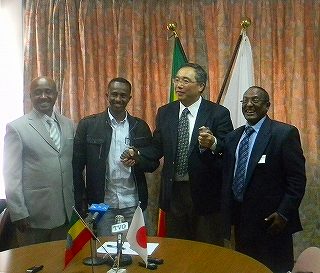| |
 |
On 13 December 2011, a signing ceremony for the 5th Round Japanese Grant Assistance for Grassroots Human Security Projects (GGP) in the Japanese Fiscal Year (JFY) 2011 took place at the Japanese Embassy. Two Ethiopian NGOs were invited as project partners to the ceremony; the Afar Community Sustainable Development Association and the Afro Ethiopia Integrated Development. The total amount of funding extended was USD 208,154. Mr. Yoshiaki Ito, Minister and Charge d’Affaires a.i. of the Embassy of Japan in Ethiopia, celebrated the occasion along with Ato Ahmed Mohammed, Board Director of the Afar Community Initiative Sustainable Development Association and Ato Shimeta Ezezew Kassa, Executive Director of the Afro Ethiopia Integrated Development.
Mr. Yoshiaki Ito, in his speech at the ceremony, said that inadequate water supply has caused the residents to lose their health, and then lose their motivation and ability to go out and be productive. Also, he mentioned that because of the time spent hauling water, women lose productive opportunities and children lose their educational opportunities. The implementation of these two projects will contribute significantly to alleviating such hindrances to development in both target areas, he said.
The Government of Japan has placed priority on human security for the vulnerable and marginalized people in society, and the GGP has played a valuable role to help such people throughout Ethiopia. Since 1997, over 300 projects have been implemented under this scheme in such sectors as education, water supply, health services, food assistance and other basic human needs. In this JFY 2011 (April 2011 – March 2012) alone, the Embassy of Japan has already awarded 9 GGP projects and is planning to award another 9.
The two recipient organizations who signed grant contracts on 13 December 2011 were:
- Afar Community Sustainable Development Association (USD 103,501)
- Afro Ethiopia Integrated Development (USD 104,653)
The description of each project is as follows:
- The Project for Water Supply, Hygiene and Sanitation in Dewe Woreda, Afar Region
- Afar Community Sustainable Development Association
In the Afar Region, the inadequate educational environment is one of the most severe problems, schools with no water points and no latrines are common, and inadequate school facilities contribute to the Region’s low school enrollment rate of 30.4%, in comparison to the national average of 80.21%. In addition to this, traditionally, it is the children’s duty to fetch water. In most cases, children walk 1-2 hours one way to the closest water point, making it difficult for them to attend school regularly. Also, the consumption of unprotected water results in water related diseases still accounting for a high percentage of childhood illnesses, causing children to lose many school days. By constructing 5 protected hand dug wells at 5 primary schools, this project aims to eradicate the obstacles that prevent children from attending classes or staying in school, and improve people’s access to safe drinking water. With this project, 3,392 students and 14,978 community members will have access to safe drinking water.
- The Project for the Rural Water Supply in Alefa Woreda, North Gonder Zone, Amhara Region
- Afro Ethiopia Integrated Development
The project is to design and implement a sustainable water supply and sanitation system for the 15 rural communities in the Alefa Woreda, North Gondor Zone, Amhara Region. In the Alefa Woreda, 75 percent of the population is suffering from lack of water. Around August (winter time in the region) most of the springs, which are the main source of water for the community, dry up. Furthermore, there is a problem utilizing the existing water resources. For instance, people and livestock share the same water point and this in turn brings about the spread of water-borne diseases. There is no pure water in the target areas; people use unprotected springs and rivers as sources of water. Water quality tests conducted by the Woreda Water Office clearly indicate that the available water is not potable but because of the absence of other alternative sources of water the people use this contaminated water. Also, a preliminary survey conducted in the clinic of the Woreda shows one out of four patients in the target area is suffering from a water related problem. With the fast increasing number of the rural population, demand for the safe drinking water is increasing and has become a grave concern. By constructing 15 hand dug wells, this project will provide safe drinking water for 12,500 people.
|
|



